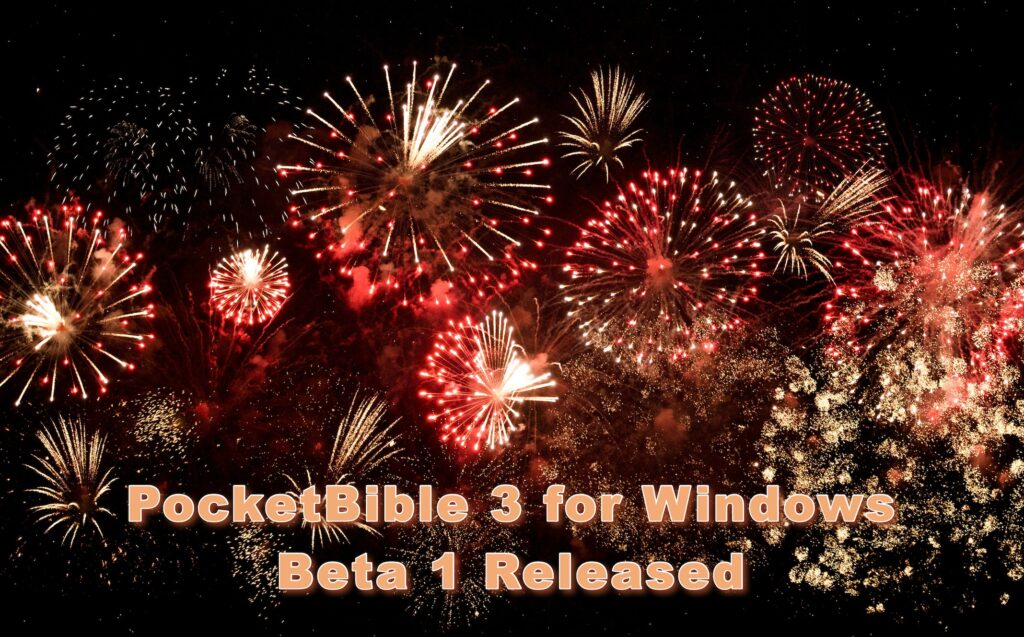
Promises Kept
“Why no update for 6 months?” you ask. It’s because I told you in Update #19 that the next update would be to announce the start of beta testing. Finally, PocketBible is being used by people who are not Laridian employees in order to make sure it’s ready for the rest of you.
Completed Tasks
Here’s a summary of accomplishments since the last update.
- Added the “Edit CSS” feature for Autostudy. Different style sheets are maintained for each type of study.
- Thorough verification of user data sync operations.
- Make sure we’re syncing user data at all the right times. Some were missing.
- Do a better job of detecting the absence of an Internet connection before trying to connect to the Laridian server.
- It was possible to get duplicate Journal entries as a result of editing the title. Rigorous review of when we should update the notes database.
- Make sure we’re checking your AFS status every time we can so we can detect new, renewed, and expired subscriptions and take appropriate action.
- Recognize the lifetime AFS subscription.
- Tweaks to some color schemes for readability.
- Testing with touch screen to fix problems with selecting tabs and dragging pane borders.
- Standardized some terminology throughout while working on the Users Guide.
- Selected an app icon — but having second thoughts.
- Bug fixes as they were encountered.
- Testing and finalizing the Windows release build and signing process.
Testing Process
The app has been released to about 25-30 testers. We like to keep this group small because at this point in the project, just managing the beta team can be a full-time job. Responding to questions, clarifying bug reports, and documenting issues is important and time-consuming. We may expand the group in the future under something like a “public preview”, but I’m hoping to go right from beta testing to product release. I expect that could be a minimum of 4-6 weeks away at this point.
One of the unique things about this project has been that we did all the development and testing on macOS. We did Windows builds to verify we could do it, then to verify we could sign the app with a security certificate (no small task), then to try to find things that are different under Windows than they are on the Mac. Our testers have been helpful with this last step, identifying a number of problems we’ve never seen because they seem to be Windows-related.
Some Questions Answered
Advanced Feature Set
Most of the AFS features from the Windows Store version of PocketBible (version 2) are standard features in version 3 (and on other platforms). This includes the ability to open more than 20 books and the ability to use the notes, highlights, bookmarks, and devotional reading progress features. The only AFS features from version 2 that are still AFS features in version 3 are the “Listen” feature that uses synthetic speech to read the Bible to you, and the ability to create named desktop layouts.
If you own the “permanent subscription to the legacy Advanced Feature Set” for PocketBible for Windows Store (aka version 2), you’ll have access to these two features (“Listen” and named layouts). For the rest of the AFS features, you’ll need a subscription to the AFS for the Windows Store version, or a subscription to the AFS for the new version when it is released.
Current AFS list for version 3:
- Autostudy — automatically prepares reports based on a selected verse/passage, word/phrase, or devotional reading date.
- Synthetic Speech — PocketBible can use the built-in speech capabilities of Windows to read any of its books or Bibles to you.
- Journal Notes — create notes that are not attached to the Bible nor any reference book. They are just accessed by name.
- Named Layouts — create multiple screen layouts for different purposes.
- “Today” Layout — create a special layout for devotional reading.
- Named Highlight Colors — assign names to your highlight colors so you can remember what each color stands for.
- Navigator — quickly see all the places where the current verse is discussed, anywhere in your entire library.
- Library Search — search your entire installed library in one operation.
- Additional Color Schemes — triple the number of color schemes available.
- Custom Color Schemes — create your own custom color scheme.
- Copy Book Link for Notes — easily create a link to any section of a reference book in your notes.
“Banned” Bibles
A number of our Bibles haven’t been compatible with either Windows version of PocketBible. All of these will work with the new version of PocketBible. They include:
- Christian Standard Bible (CSB) and CSB with Strong’s Numbers
- Common English Bible (CEB)
- Contemporary English Version (CEV)
- Evangelical Heritage Version (EHV)
- Founders’ Bible
- Good News Translation (GNT)
- Greek New Testament Collection
- Legacy Standard Bible (LSB) and LSB with Strong’s Numbers
- NET Bible with Strong’s Numbers and Full Notes
- New Revised Standard Version: Updated Edition (NRSVue)
- NIV with Goodrick-Kohlenberger Numbers
- Reina-Valera 1960 (RVR60)
- Simplified KJV Bible (SKJV)
- The Passion Translation (TPT)
- Tree of Live Version (TLV)
- World English Bible (WEB) with Strong’s Numbers
Transition Plan
When the new version becomes available, we will immediately remove PocketBible for Windows Store (version 2) from the Windows Store, and remove PocketBible for Windows Desktop (version 1) from our website.
PocketBible 3 for Windows will be downloadable from our website. Currently there is no plan to make it available on the Microsoft Store.
We will drop tech support for the Windows Store version (version 2) no later than 6 months after release of version 3. We may continue to support the Windows Desktop version for a little longer, since it still has some Windows 7 users.
macOS and Linux?
 We’ve alluded to the fact that our development stack permits building version of the app for macOS and Linux from the same source code we use for Windows. If we were to do this, our first priority would be macOS, but to date we haven’t been able to successfully sign the macOS build with a distribution certificate. If that were possible, we would replace today’s macOS version with a version built with this same code base.
We’ve alluded to the fact that our development stack permits building version of the app for macOS and Linux from the same source code we use for Windows. If we were to do this, our first priority would be macOS, but to date we haven’t been able to successfully sign the macOS build with a distribution certificate. If that were possible, we would replace today’s macOS version with a version built with this same code base.
We’ve never tried to do a Linux build. We have no way to test it since we don’t run Linux here. Linux has less market penetration than macOS, and it can be argued that the macOS version of PocketBible doesn’t pull its weight. So we don’t imagine that a Linux version would.
Was this article posted on 3/27/2028?
I only noticed it on 4/8/2025 and am wondering if my browser is not refreshing the blog (cache) correctly.
I have noticed other posts were dated a week or so before I noticed them as well. I’ll be checking back for news on the new release.
This is exciting news. I have used PocketBible for many years, on my phone (and I even think my PDA) and my desktop. I am slowly building up my library and have followed this development eagerly. I was taking a break from studying I Peter and thought I’d see if there had been any new developments. Thank you for your devoted work to make God’s Word more available.
As for the MacOS version not pulling its own weight.
I use the MacOS version perhaps more than half the time when I’m at home; frequently using both the iPhone and MacOS concurrently as there is only 1 study panel and I often want 2. I generally only edit on one platform at a time and use the other for reference or searching. I generally the MacBook for quickness and reference since you can search personal notes quickly and there are additional search features. I generally edit notes on the iPhone but the editing can be annoying slow so I’m starting to either edit on the MacBook or, when not at home, copy/edit into the iPhone Notes and copy/paste the changes in PocketBible.
I do realize that you can search notes on the iPhone but, with my number of notes, this is essentially a dead function (I understand the technical reason). I haven’t searched notes on the iPhone for probably 2 years or more.
However, when asked which platform I use, I generally choose the iPhone since I carry that with me. At home, any serious work and/or study (except editing) is done on the MacBook or on both. I also download a copy of my notes to the MacBook and use the MacOS text editor to locate things which the search function in PocketBible doesn’t handle (such as numerics, punctuation, and text formatting strings); I’ve also recovered butchered notes from that download. But I can’t say I use both when choosing which platform I use; perhaps I’ll start saying MacBook since, with the exception of mobility, it is the more functional platform.
I somehow managed to miss there was a new version for Windows in the works until today, and now I’ve very excited!
If you ever wanted people to test a Linux build of the application, I’d be more than happy to volunteer. Been programming on Linux daily for the last 18 months, and one of the few things holding me back from a full migration from Windows has been the lack of a good bible study option.
You all will like this new version! The time I saved from on having to fight the issue in linking my android phone to access the journal gives me some time for the testing and my sermon prep is much nicer now!